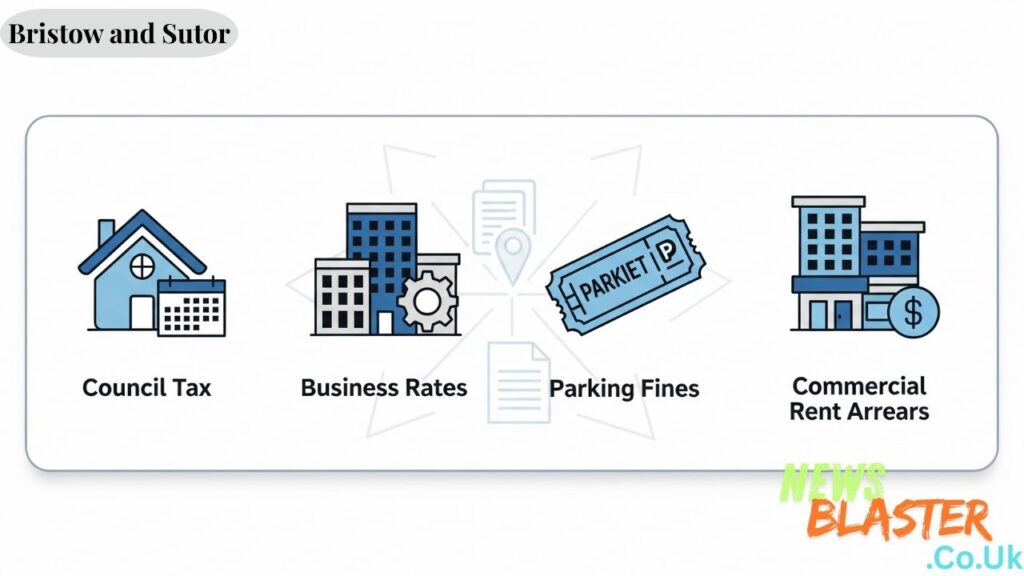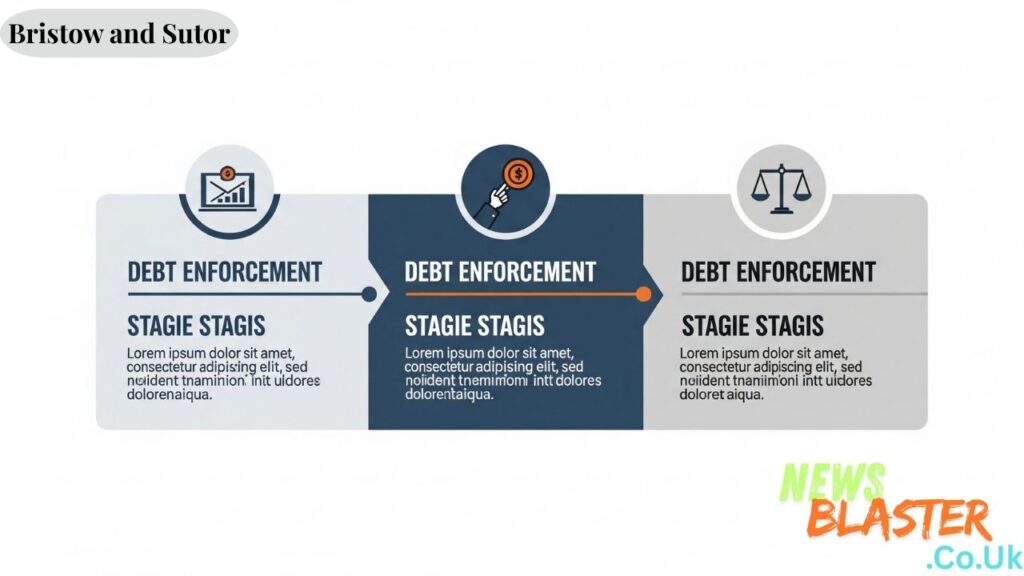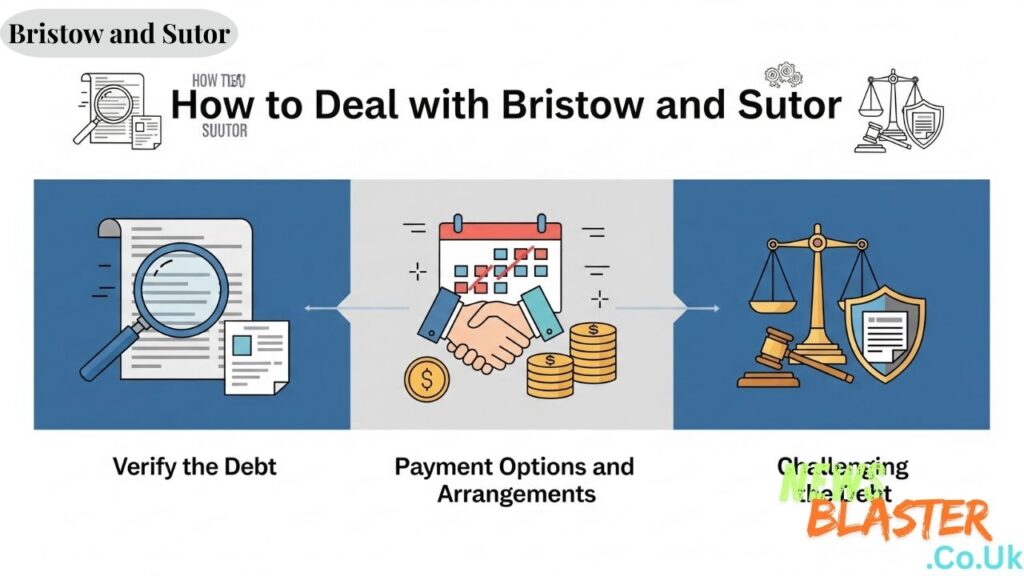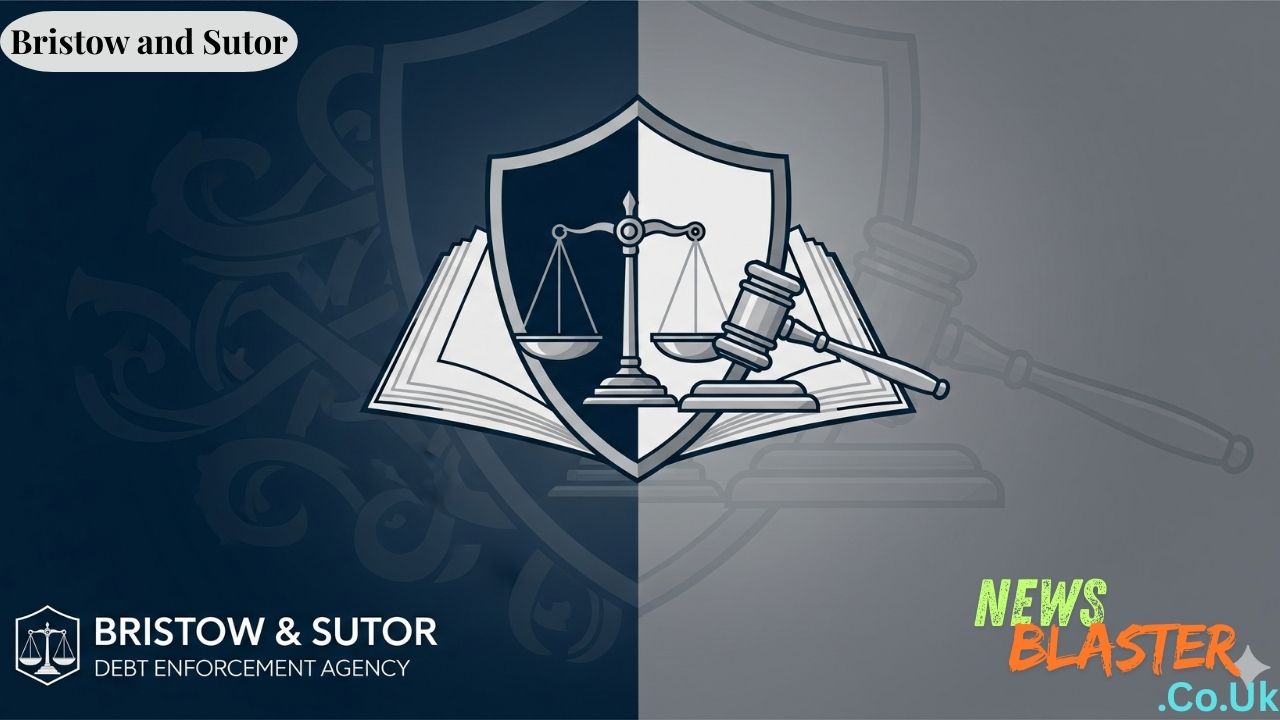What is Bristow and Sutor?
Bristow and Sutor is one of the UK’s leading enforcement agencies, specializing in debt recovery services for local authorities and commercial clients. This company operates as an authorized enforcement agent, working closely with councils across England and Wales to collect unpaid debts, including council tax, business rates, and penalty charge notices.
The enforcement agency has built a reputation as a professional debt collection service, though many individuals find themselves dealing with their services during challenging financial circumstances. Understanding how this company operates and knowing your rights when facing enforcement action is crucial for anyone who receives correspondence from them.
Company Background and Authority
Bristow and Sutor operates under strict regulatory guidelines as a certified enforcement agency. They work with over 203 local authorities throughout England and Wales, making them one of the most active enforcement companies in the UK. Their operations are governed by legislation including the Taking Control of Goods Regulations 2013, which outlines the legal framework for enforcement actions.
The company has established itself as a major player in the debt recovery sector, with a sister company called Credit Security that handles additional debt collection services. This partnership allows them to offer comprehensive debt recovery solutions to their local authority clients while maintaining professional standards in their enforcement activities.
Types of Debts They Collect
Bristow and Sutor handles various types of debt recovery, including:
- Council Tax arrears: Unpaid council tax bills that have progressed to enforcement stage
- Business Rates: Non-domestic rates owed by commercial properties
- Penalty Charge Notices: Parking fines and traffic violations
- Commercial Rent Arrears: Outstanding rent payments from business tenants
Each type of debt follows specific legal procedures, and the company must adhere to different regulations depending on the nature of the debt being recovered.
Services and Enforcement Areas

Council Tax Collections and Enforcement
The primary service offered by Bristow and Sutor involves council tax collection for local authorities. When residents fall behind on their council tax payments, councils may refer these cases to enforcement agents after obtaining a liability order from the magistrates’ court.
The enforcement process follows a structured timeline that begins with initial contact attempts and can progress to bailiff visits if payment arrangements are not made. During this process, the company works within strict legal guidelines that protect both the debtor’s rights and the local authority’s interests.
Notice of Enforcement procedures form a critical part of their council tax collection process. These notices provide clear information about the debt amount, additional fees, and the timeframe for payment before further enforcement action is taken.
Non-domestic Rates and BID Levy Collection
Business rates recovery represents another significant area of operation for the enforcement agency. Commercial property owners who fall behind on their non-domestic rates may find their cases referred to Bristow and Sutor for collection.
Business Improvement District (BID) levies are also collected by the company on behalf of local authorities. These special charges fund improvements in specific business areas, and enforcement action may be taken against businesses that fail to pay their BID contributions.
Penalty Charge Notice Collections
Parking fine enforcement forms a substantial part of their operations. When individuals fail to pay parking penalties within the specified timeframe, local authorities may engage Bristow and Sutor to recover these debts.
The escalation process for unpaid fines follows a clear progression, starting with reminder notices and potentially leading to enforcement agent visits. Understanding this process helps individuals take appropriate action before enforcement costs escalate.
Commercial Rent Arrears
Recovery of commercial property debts represents another service area. Landlord-tenant enforcement cases may be referred to the company when business tenants fall behind on rent payments, though this typically requires specific legal procedures and court orders.
The Enforcement Process

Initial Contact and Notices
First contact procedures typically involve sending formal notices to debtors informing them of the outstanding debt and the intention to commence enforcement action. These notices provide important information about payment options and the consequences of non-payment.
The types of notices sent vary depending on the nature of the debt, but all must comply with legal requirements regarding content and timing. Seven-day payment period requirements are standard, giving debtors an opportunity to settle their accounts before further action is taken.
Enforcement Notice Stage
An enforcement notice is triggered when initial payment requests are unsuccessful and the legal requirements for enforcement action have been met. This stage marks a significant escalation in the debt recovery process.
The legal authority behind enforcement actions stems from liability orders, court judgments, or other legal instruments that grant enforcement agents specific powers. Seven-day notice periods before home visits are mandatory, giving debtors final opportunity to resolve matters without face-to-face enforcement.
Bailiff/Enforcement Agent Visits
When visits can occur is strictly regulated by law. Generally, enforcement agents may visit between 6 AM and 9 PM, and they cannot visit on Sundays or bank holidays without special circumstances or court permission.
Legal powers and limitations are clearly defined in enforcement legislation. While agents have significant powers to recover debts, they must operate within strict boundaries that protect debtors’ rights and ensure fair treatment.
What enforcement agents can and cannot do forms a crucial area of knowledge for anyone facing enforcement action. They cannot force entry to residential properties for most types of debt, and they must follow specific procedures when taking control of goods.
Your Rights and Protections
Legal Rights During Enforcement
Entry rights and restrictions provide important protections for debtors. For most council tax and penalty charge debts, enforcement agents cannot force entry to residential properties on their first visit, though they may gain peaceful entry if invited in or if doors are left open.
Vulnerable person protections are built into enforcement procedures. Individuals with serious health conditions, disabilities, or other vulnerabilities should receive special consideration, and enforcement action may be suspended or modified to accommodate their circumstances.
Time restrictions on visits ensure that enforcement agents cannot arrive at inappropriate hours. Standard visiting times are between 6 AM and 9 PM on weekdays and Saturdays, with Sunday visits generally prohibited.
Goods That Cannot Be Seized
Essential household items are protected from seizure under enforcement regulations. These include basic furniture, clothing, bedding, and items necessary for daily living, ensuring that debtors can maintain basic living standards.
Work tools and equipment valued up to £1,350 cannot be seized if they are necessary for the debtor’s employment or business. This protection helps ensure that enforcement action doesn’t prevent individuals from earning income to pay their debts.
Items belonging to others are also protected from seizure. Enforcement agents must take reasonable care to ensure they only take control of goods belonging to the debtor, and they may be liable for losses if they incorrectly seize others’ property.
Complaint Procedures
How to lodge complaints involves contacting Bristow and Sutor directly in the first instance, providing details of the issue and any supporting evidence. Most companies have formal complaint procedures that must be followed before escalating matters further.
Escalation processes may involve referring unresolved complaints to trade associations or regulatory bodies. The enforcement industry is subject to various forms of oversight, and persistent issues may be addressed through these channels.
Regulatory oversight comes from multiple sources, including local authority monitoring, trade association standards, and court supervision in some cases. This multi-layered approach helps ensure that enforcement agents operate professionally and within legal boundaries.
How to Deal with Bristow and Sutor

Immediate Actions to Take
Verify the debt legitimacy by requesting full details of the debt, including the original amount, any court orders, and a breakdown of additional charges. This verification process is crucial because enforcement action cannot legally proceed without proper documentation.
Check for liability order requirements, as these are mandatory for council tax enforcement. Without a valid liability order, enforcement agents cannot take control of goods, and debtors have grounds to challenge the enforcement action.
Request debt breakdown and charges in writing, including details of enforcement fees and how they have been calculated. Understanding the total amount owed and how it has been calculated helps inform decisions about payment options.
Payment Options and Arrangements
Setting up payment plans with Bristow and Sutor may be possible, though the company’s willingness to accept arrangements can vary. When Bristow and Sutor won’t accept payment plan proposals, debtors may need to explore alternative approaches or seek professional advice.
Negotiating affordable arrangements requires demonstrating genuine financial hardship and providing evidence of income and essential expenses. Reasonable payment proposals based on realistic financial assessments are more likely to be accepted.
Full settlement options may include discounts on enforcement fees in some cases, particularly where immediate payment can be made. However, any agreements should be confirmed in writing before payment is made.
Challenging the Debt
Grounds for dispute may include errors in the original debt calculation, procedural failures in the enforcement process, or disputes about liability for the debt. Valid challenges can halt enforcement action while matters are investigated.
Statutory declarations provide a formal mechanism for challenging liability orders that were made in absence of the defendant. These must be made within strict time limits and follow specific legal procedures.
Time limits for challenges are critical and vary depending on the type of challenge being made. Acting quickly is essential, as delayed challenges may be rejected even if they have merit.
Stopping Enforcement Action
Emergency Measures
Controlled goods agreements allow debtors to retain possession of their belongings while making payment arrangements. These agreements must be realistic and affordable; breaking the agreement may result in the removal of goods.
Temporary protection options may be available for vulnerable individuals or where enforcement action would cause exceptional hardship. These protections are not automatic and usually require formal application.
Court applications for relief may be necessary in complex cases or where enforcement agents have exceeded their powers. Legal representation may be advisable for court applications, given the complexity of enforcement law.
Long-term Solutions
Debt management plans can provide structured approaches to dealing with multiple debts, including those being pursued by Bristow and Sutor. These plans typically involve negotiating affordable monthly payments with all creditors.
Individual Voluntary Arrangements (IVAs) offer formal alternatives to bankruptcy for individuals with significant debt problems. IVAs can halt enforcement action and provide breathing space to resolve financial difficulties.
Bankruptcy considerations may be appropriate in severe cases where debts cannot be realistically repaid. While bankruptcy has serious consequences, it can provide relief from enforcement action and offer a fresh start.
Professional Support
Free debt advice services are available from organizations like Citizens Advice, StepChange, and National Debtline. These services can provide expert guidance on dealing with enforcement action and exploring debt solutions.
Citizens Advice guidance covers enforcement rights and procedures, helping individuals understand their position and options when facing enforcement action. Their advisers can also provide representation in some cases.
Legal representation options may be necessary for complex enforcement cases or where legal challenges are being made. Some legal aid may be available for enforcement matters, depending on individual circumstances.
Frequently Asked Questions
Can Bristow and Sutor force entry to residential properties?
For most types of debt including council tax and penalty charges, Bristow and Sutor cannot force entry to residential properties on their first visit. They can only enter peacefully through open doors or with the householder’s permission. Forced entry is generally only permitted for commercial properties or after goods have been seized on previous visits.
What happens if nobody is home during an enforcement visit?
If no one is home during a visit, enforcement agents typically leave a notice of visit explaining their attempt and providing contact information. They cannot enter empty properties without specific court authorization, and they must return at reasonable times to attempt contact with the debtor.
How can individuals verify if a debt is legitimate?
Debt verification involves requesting full documentation including the original debt details, any court orders such as liability orders, and a complete breakdown of charges. Legitimate enforcement action must be backed by proper legal documentation, and debtors have the right to see this evidence.
What are the additional fees and charges that can be applied?
Additional fees and charges vary depending on the type of debt and the stage of enforcement. These typically include compliance fees, enforcement fees, and possible sale fees if goods are removed. All charges must comply with statutory fee scales and be clearly itemized.
Can individuals negotiate payment terms directly with the company?
Direct negotiation is often possible, though success varies depending on individual circumstances and the company’s policies. Payment proposals should be realistic and supported by evidence of financial circumstances. It’s important to get any agreements confirmed in writing.
What protections exist for vulnerable individuals or those with mental health issues?
Special protections exist for vulnerable individuals, including those with serious health conditions, disabilities, or mental health issues. Enforcement action may be suspended or modified, and additional support should be provided. Vulnerability should be disclosed early in the process for appropriate protections to apply.
How can formal complaints be made against the company?
Formal complaints should initially be made directly to Bristow and Sutor using their complaints procedure. If unsatisfied with their response, complaints can be escalated to relevant trade associations or regulatory bodies. The process should be documented in writing with supporting evidence.
Additional Resources and Support
Free Debt Advice Organizations
Citizens Advice provides free, impartial advice on dealing with enforcement action and debt problems. Their trained advisers understand enforcement law and can help individuals navigate the process while protecting their rights.
StepChange Debt Charity offers comprehensive debt advice and can help negotiate with creditors including enforcement agencies. They provide online debt advice tools and telephone support for individuals facing financial difficulties.
National Debtline provides free telephone debt advice and produces helpful factsheets about enforcement action. Their advisers can help individuals understand their options and rights when dealing with enforcement agencies.
PayPlan offers free debt advice and can help set up debt management plans. They work with individuals to create realistic budgets and negotiate affordable payment arrangements with creditors.
Legal Resources
Civil Legal Advice provides free legal help for eligible individuals facing enforcement action. They can advise on legal rights and may be able to provide representation in some circumstances.
Law centres offer free legal advice in many areas and may be able to help with enforcement issues. They often specialize in social welfare law and understand the complexities of enforcement procedures.
Pro bono legal services may be available for complex enforcement cases or where individuals need court representation. These services are provided by volunteer lawyers and may be accessed through various legal charities.
Government and Council Support
Council Tax reduction schemes may be available for individuals experiencing financial hardship. These schemes can reduce ongoing council tax liability and may help prevent future enforcement action.
Discretionary housing payments can provide additional support for housing costs and may free up income to deal with other debts. Applications are made through local councils and are subject to available funding.
Hardship funds operated by local councils may provide emergency financial assistance for individuals facing severe financial difficulties. These funds can sometimes help clear debts that are subject to enforcement action.
Related Topics and Cross-References
Understanding other major enforcement agencies helps individuals recognize the broader landscape of debt collection in the UK. Different agencies may have varying approaches and policies, though all must operate within the same legal framework.
Council Tax exemptions and discounts may be available to reduce ongoing liability and prevent future enforcement issues. Understanding eligibility criteria for these schemes can provide significant financial relief.
Business rates relief options exist for commercial property owners facing financial difficulties. These reliefs can reduce ongoing liability and may help businesses avoid enforcement action.
Parking fine appeals processes offer opportunities to challenge penalty charges before they reach enforcement stage. Understanding appeal procedures and time limits can help avoid unnecessary enforcement costs.
Debt management strategies encompass various approaches to dealing with multiple debts and financial difficulties. Professional debt advice can help individuals choose the most appropriate strategy for their circumstances.
Contact Information and Next Steps
How to Contact Bristow and Sutor
The Bristow and Sutor contact number is available through their official correspondence and website. When contacting them, individuals should have their reference numbers ready and be prepared to discuss their circumstances honestly.
For those seeking to access their account or payment portal, the Bristow and Sutor login facility is available through www.bristowsutor.co.uk contact us page, though individuals should ensure they are using official contact methods to avoid scams.
Emergency Contact Numbers
Emergency contact numbers for urgent situations may be available outside normal business hours, though non-urgent matters are typically handled during standard business times. Emergency contact is usually reserved for situations involving vulnerable individuals or immediate enforcement concerns.
Professional Advice Referrals
Professional advice referrals can be provided by various organizations including Citizens Advice, law centres, and debt advice charities. These referrals help connect individuals with appropriate specialist support for their circumstances.
Action Plan Template
An action plan template for dealing with enforcement should include immediate steps such as debt verification, assessment of rights and protections, exploration of payment options, and consideration of professional advice. Having a structured approach helps ensure important steps are not overlooked during what can be a stressful process.
Also Read: Workwear Express Fast Delivery Work Clothing

